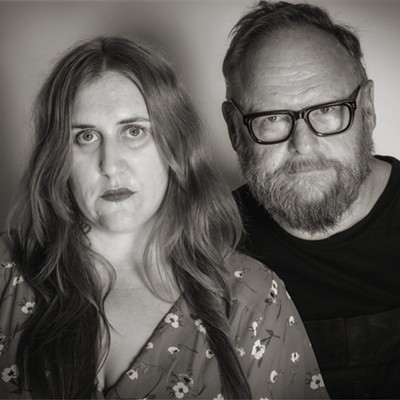While Mimi and I talked, baby Hollis laughed and ate her lunch, Mimi pausing mid-interview ("Oh, did you eat it all? We have to fill up the tray!") to give her more food. You'd never know that the day before, they'd just returned from a European tour, or that they were leaving their hometown of Duluth the next day for a West Coast tour, which brings Low to Tucson Tuesday, April 24, at Solar Culture.
With music like Low's, people often assume that Sparhawk and Parker must be "somber, quiet people who don't talk very much," said Sparhawk, adding, "That's not true." Even though in the past seven years they've put out seven albums and seven EPs of minimalist music that critics have dubbed "slowcore," and have enjoyed a small amount of fame when Gap decided to use their version of "Little Drummer Boy" in a commercial this past holiday season, Low contains perfectly normal people.
Low began in early 1993, recalls Parker, with Sparhawk and Low's original bassist, John Nichols (replaced in 1994 by Zak Sally). "I had played marching drum in high school, so they thought, 'Hmmm, let's get Mim to play in the band, let's get her a little snare and a cymbal--she can do that!'" remembers Parker.
They wrote a few songs, recorded a demo, sent it off to some labels, and then "(New York producer) Kramer wrote us a letter asking us to come and record in his studio," Parker said modestly. "We thought, well, wow, that's pretty crazy. We were pretty excited. So we went and did it with no real intention of anything happening because of it. Then (Kramer) knew somebody at this label called Vernon Yard and gave him the demos and for some reason it caught their ear or whatever; they thought they would be willing to sign us, and they asked us to come out and record the rest of the CD, so we did that. It was really fast. The band started in April and we recorded (I Could Live in Hope) in August and September and it was out in January or February of '94."
Low went on to record 1995's Long Division and 1996's The Curtain Hits the Cast with Vernon Yard before leaving that label in 1998. Things We Lost in the Fire is Low's second album with Kranky Records out of Chicago.
Things We Lost in the Fire is different from earlier Low albums in that the pace has been quickened, which provides for a tension between what is normally recognizable as Low music--a few, single notes that barely become a chord from the guitar; slow, sparse bass; simple drum rhythms--and a more upbeat, layered sound.
Low was created in the middle of the grunge era, when music was loud and messy, so it's interesting that Things We Lost in the Fire was produced by Steve Albini, who is better known for his work with bands like Nirvana and Garbage-- bands that are about as un-Low as you can get, "the louder crowd," as Parker put it.
But Parker wasn't so quick to say that Low was created initially as a response to that sort of music. "We got this band together with the idea and the intention that it would just be different," she said.
But as with any kind of art, when you have preconceived ideas about what it's going to be like, the boundaries become more and more difficult to negotiate over time. Things We Lost in the Fire is a balancing act, vacillating between something on the verge of fast-paced and hauntingly slow vocals that suspend in the air like smoke. But as Sparhawk admits, "It was a really confusing record to make. In doing this record, I gained a little bit more respect for the parameters that we've chosen in the past, because I think some good things have come out of that.
"We're basically a band that's built on specific rules and guidelines and a territory that we've been working in--quiet, slow, minimal, whatever--and we've become accustomed to that. So stepping out of it is a little scary," said Sparhawk. "The toughest thing is trying to figure out, well, is this song appropriate for Low, or how can we make it fit Low, or is it silly us for us to even be thinking that we need to put this into some sort of Low world? With this record, we kind of allowed ourselves to not have to do that. That's probably why some of the songs are more poppy, more bold."
"Dinosaur Act" is probably the "poppiest" song on the record, with its distorted guitars, marching-drum-esque bass drums and Sparhawk's emphatic cry of "Dinosaur!" at the end of the chorus. On "In Metal," Hollis squeaks in the background and Parker laments, "Partly hate to see you grow," while gong-like drums escalate into almost wailing guitars. But even at its loudest moments, Things We Lost in the Fire is subtle; everything is in a comfortable state of control. The slower songs, by contrast, become even more minimal, every note holding more power.
The tension between fast and slow on Things We Lost in the Fire makes Low even more of a force to reckon with--the ability to distill an emotion in a song to its perfect pitch, whether it's stripped down or layered just a little, is something few bands can pull off without sounding schizophrenic. But Sparhawk isn't sure if it's something they're going to keep doing. "Some days I feel like the next thing we're gonna do is going to be the most subdued, minimal thing we've ever done, and some days I feel like making something that sounds like a Phil Spector record," he said.
Things We Lost in the Fire comes to terms with the different forces pulling at it by just letting them be. The strings on "Like A Forest" weave between Sparhawk and Parker's voices as they sing, "We used to speak a different language." The language Low speaks now, though, isn't exactly different; it just has a widened vocabulary.
Low appears with opener La Circa at 9 p.m. Tuesday, April 24 at Solar Culture, 31 E. Toole Ave. Cover for the all-ages show is $7. For more information call 884-0874.










